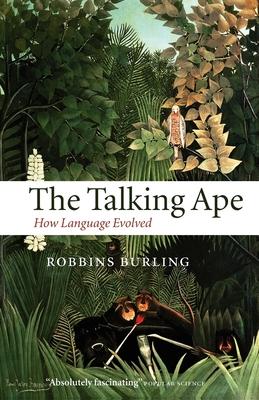Humans never run out of things to say. We explain, we cajole, we gossip, and we flirt--all with the help of language. But how in the space of several million years did we evolve from an ordinary primate that that could not talk to the strange human primate that can't shut up?
In this fascinating, thought-provoking book, Robbins Burling presents the most convincing account of the origins of language ever published, shedding new light on how speech affects the way we think, behave, and relate to each other, and offering us a deeper understanding of the nature of language itself. Burling argues that comprehension, rather than production, was the driving force behind the evolution of language--we could understand words before we could produce them. As he develops this insight, he investigates the first links between signs, sounds, and meanings and explores the beginnings of vocabulary and grammar. He explains what the earliest forms of communication are likely to have been, how they worked, and why they were deployed, suggesting that when language began it was probably much more dependent on words like "poke" or "whoosh," words whose sounds have a close association with what they refer to. Only gradually did language develop the immense vocabulary it has today. Burling also examines the qualities of mind and brain needed to support the operations of language and the selective advantages they offered those able to use them.
Written in a crystal-clear style, constantly enlivened by flashes of wit and humor, here is the definitive account on the birth of language.
| FindBook |
有 1 項符合
The Talking Ape: How Language Evolved的圖書 |
 |
The Talking Ape: How Language Evolved 作者:Burling、Robbin 出版社:OUP Oxford 出版日期:2007-05-17 語言:英文 規格:平裝 / 286頁 / 19.3 x 12.7 x 2.3 cm / 普通級 |
| 圖書館借閱 |
| 國家圖書館 | 全國圖書書目資訊網 | 國立公共資訊圖書館 | 電子書服務平台 | MetaCat 跨館整合查詢 |
| 臺北市立圖書館 | 新北市立圖書館 | 基隆市公共圖書館 | 桃園市立圖書館 | 新竹縣公共圖書館 |
| 苗栗縣立圖書館 | 臺中市立圖書館 | 彰化縣公共圖書館 | 南投縣文化局 | 雲林縣公共圖書館 |
| 嘉義縣圖書館 | 臺南市立圖書館 | 高雄市立圖書館 | 屏東縣公共圖書館 | 宜蘭縣公共圖書館 |
| 花蓮縣文化局 | 臺東縣文化處 |
|
|
圖書介紹 - 資料來源:博客來 評分:
圖書名稱:The Talking Ape: How Language Evolved
內容簡介
|










